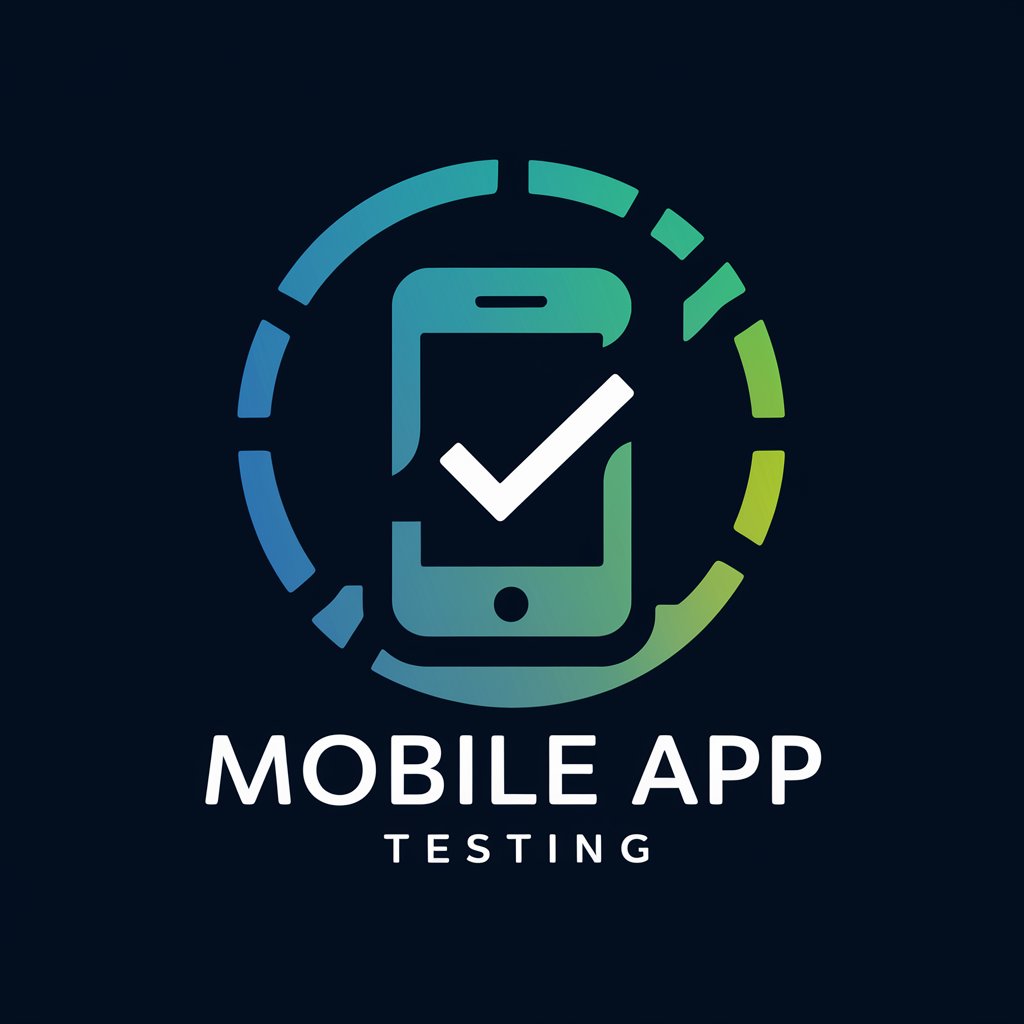Mobile App Testing - Efficient Mobile App Quality Assurance

Welcome to Mobile App Testing! Let's optimize your app's quality together.
Elevate Your App's Quality with AI-Powered Testing
How can I ensure the stability of my app?
What are the best practices for testing app security?
How do I handle device fragmentation in mobile app testing?
What metrics should I track for app performance?
Get Embed Code
Introduction to Mobile App Testing
Mobile App Testing encompasses various practices and strategies aimed at ensuring the quality and reliability of mobile applications. It addresses unique challenges such as device fragmentation, operating system diversity, user interaction differences compared to desktop applications, and the critical nature of user experience in app success. Examples include testing for functionality, performance, usability, security, and compatibility across multiple devices and platforms. Powered by ChatGPT-4o。

Main Functions of Mobile App Testing
Functionality Testing
Example
Ensuring the app works as intended on different devices and operating systems.
Scenario
A banking app must reliably perform transactions, display account information, and manage user profiles across all supported devices.
Usability Testing
Example
Assessing the app's ease of use and user satisfaction.
Scenario
Testing a fitness app's navigation and interaction flow to ensure users can easily track their workouts and progress.
Performance Testing
Example
Measuring app responsiveness, speed, and stability under various conditions.
Scenario
Evaluating a video streaming app's load times and buffering speed under different network speeds and conditions.
Security Testing
Example
Identifying vulnerabilities in the app that could compromise user data.
Scenario
Checking an e-commerce app for secure payment processing and data encryption to protect user information.
Compatibility Testing
Example
Ensuring the app functions correctly across different devices, OS versions, and screen sizes.
Scenario
Validating that a social media app displays correctly and operates on both the latest and older smartphones.
Ideal Users of Mobile App Testing Services
App Developers
Developers benefit from mobile app testing by ensuring their applications meet quality standards and function as intended across various devices and platforms.
Quality Assurance Professionals
QA professionals use mobile app testing to identify and address issues before an app is released, ensuring a positive user experience.
Product Managers
Product managers rely on mobile app testing to make informed decisions about feature enhancements, user interface improvements, and overall product direction.
Business Stakeholders
Business stakeholders, including marketers and executives, use app testing to ensure the app aligns with business goals, such as user engagement and revenue generation.

How to Use Mobile App Testing
Start your journey
Head over to yeschat.ai to begin your free trial immediately, no signup or ChatGPT Plus required.
Identify your app category
Determine the category of your mobile app to tailor the testing process effectively. This step is crucial for focusing on relevant Quality Attributes and Monsters.
Select testing focus areas
Choose specific Quality Attributes or Monsters to focus on, such as Performance, Usability, or Security, based on the nature of your app.
Implement testing strategies
Apply targeted testing strategies for selected areas, using automated and manual testing methods to uncover and address potential issues.
Analyze and iterate
Review testing results, make necessary adjustments, and retest as needed. Continuous improvement is key to maintaining high app quality.
Try other advanced and practical GPTs
Canadian Chat
Your Friendly, AI-Powered Canadian Buddy

C# Design Patterns
Streamlining Software Design with AI

Astro Guide GPT
Exploring the universe with AI-powered guidance.

Pet Behavior Coach
Empowering pet owners with AI-driven behavior solutions.

Sentence & Paragraph Rewriter
Empower Your Writing with AI

FOUNDATION MODEL
Empower your learning with AI

Stellar Drifters
Craft Your Cosmic Adventure

Subcreation
Craft Your Adventure with AI

JiraGPT - Access your Issues
AI-powered tool for effortless Jira management

The Cultural Diplomat
Navigate Culture with AI-powered Insight

Creative Muse
Igniting Creativity with AI

Photo Based Insightful Muse
Crafting impactful stories with AI

Detailed Q&A on Mobile App Testing
What is Mobile App Testing?
Mobile App Testing involves evaluating the functionality, usability, and consistency of mobile applications across various devices and platforms, ensuring they meet user expectations and quality standards.
Why is device fragmentation a challenge in Mobile App Testing?
Device fragmentation refers to the variety of mobile devices, operating systems, and screen sizes, making it challenging to ensure an app runs smoothly across all possible combinations.
How does Mobile App Testing address security concerns?
Testing focuses on identifying vulnerabilities in the app's code, data handling, and network communications to prevent unauthorized access and protect user data.
What role does user feedback play in Mobile App Testing?
User feedback is crucial for identifying real-world usage issues, enhancing app features, and improving user satisfaction, making it a valuable component of the testing process.
How can automated testing benefit Mobile App Testing?
Automated testing allows for the efficient execution of repetitive tasks, consistency in test results, and the ability to quickly identify regressions, enhancing the overall quality and speed of testing.
